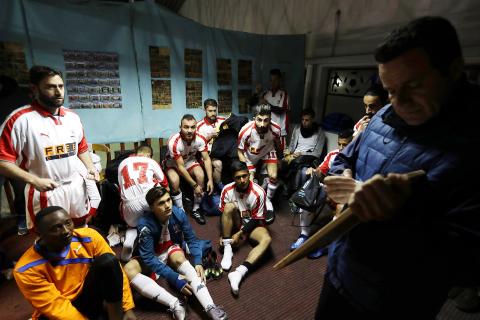Soccer fans of a certain age may still remember Antonis Nikopolidis for his resemblance to American actor George Clooney and as the goalkeeper who helped Greece become surprise European Champions in 2004.
Now the country’s national youth team coach, Nikopolidis is helping refugees stranded in Greece regain a sense of purpose. The soccer team he helped build, named Hope (Elpida in Greek), is made up of players who fled warzones in Syria, Yemen, Iraq and Afghanistan. Most of Hope’s players live in Skaramangas, an industrial zone west of Athens where metal containers have been turned into shoebox-shaped homes. They compete in an amateur league on Sundays, facing teams made up of lawyers, telecom workers and accountants.
Nikopolidis, a soft-spoken 46-year-old whose hair has turned silver in retirement, says team practices and matches provide a welcome distraction for young men facing uncertain futures in the European Union’s slow-moving relocation program.

Photo: Thanassis Stavrakis, AP
“We’re helping people who are at a difficult moment in their lives,” he said. “They are guests in our country, and we are trying with this team to give them a few hours of happiness.”
Soccer is the main source of entertainment for many of the 60,000 refugees and economic migrants living in camps around Greece while they wait for asylum applications to be processed and a possible move elsewhere in Europe.
“You have to spend your time (doing something) because it’s very boring,” Hozaifa Hajdepo, 23, a Hope player from Syria, said. “If you stay in your home and you don’t have work, you will [feel] like ... you will die.”
The Union of European Football Associations, the governing body for soccer in Europe, has awarded grants to assist refugees in 15 countries. Some of the money that went to Greece is being used to sponsor Nikopolidis’ team.
Nearly 9,000 refugees have been moved from Greece to other European Union countries, and the coach already has lost several players. But with the pace of relocations still at just over half the target rate, most of the team expects to be in Greece for a while.
“It’s a joy for me to do this,” Nikopolidis said. “The main thing is that they enjoy it, that they have fun ... We have created a group of friends, with bonds of friendship, a family.”

June 2 to June 8 Taiwan’s woodcutters believe that if they see even one speck of red in their cooked rice, no matter how small, an accident is going to happen. Peng Chin-tian (彭錦田) swears that this has proven to be true at every stop during his decades-long career in the logging industry. Along with mining, timber harvesting was once considered the most dangerous profession in Taiwan. Not only were mishaps common during all stages of processing, it was difficult to transport the injured to get medical treatment. Many died during the arduous journey. Peng recounts some of his accidents in

“Why does Taiwan identity decline?”a group of researchers lead by University of Nevada political scientist Austin Wang (王宏恩) asked in a recent paper. After all, it is not difficult to explain the rise in Taiwanese identity after the early 1990s. But no model predicted its decline during the 2016-2018 period, they say. After testing various alternative explanations, Wang et al argue that the fall-off in Taiwanese identity during that period is related to voter hedging based on the performance of the Democratic Progressive Party (DPP). Since the DPP is perceived as the guardian of Taiwan identity, when it performs well,

A short walk beneath the dense Amazon canopy, the forest abruptly opens up. Fallen logs are rotting, the trees grow sparser and the temperature rises in places sunlight hits the ground. This is what 24 years of severe drought looks like in the world’s largest rainforest. But this patch of degraded forest, about the size of a soccer field, is a scientific experiment. Launched in 2000 by Brazilian and British scientists, Esecaflor — short for “Forest Drought Study Project” in Portuguese — set out to simulate a future in which the changing climate could deplete the Amazon of rainfall. It is

Artifacts found at archeological sites in France and Spain along the Bay of Biscay shoreline show that humans have been crafting tools from whale bones since more than 20,000 years ago, illustrating anew the resourcefulness of prehistoric people. The tools, primarily hunting implements such as projectile points, were fashioned from the bones of at least five species of large whales, the researchers said. Bones from sperm whales were the most abundant, followed by fin whales, gray whales, right or bowhead whales — two species indistinguishable with the analytical method used in the study — and blue whales. With seafaring capabilities by humans